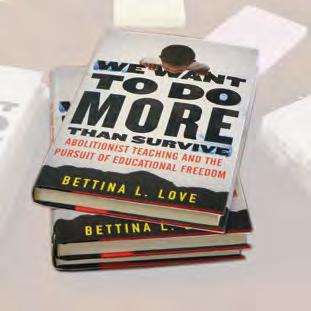
5 minute read
Up front: Resilience and Community during the COVID-19 pandemic
Joining with institutions around the world, the University of Pittsburgh School of Education enacted safety measures to limit the spread of the coronavirus during the spring academic term. All spring and summer courses were moved to remote learning. Faculty and staff were instructed to work from home. Large in-person gatherings, like the school’s spring graduation, were cancelled or postponed. Faced with an unprecedented environment of social distancing, the school forged ahead with its mission to ignite learning and to support the health and well-being of all.
School of Education doctoral candidates, like Marijke Hecht (second from left), conducted virtual dissertation defenses.



Academic Life
Pivoting to Online Learning
Professors and students accustomed to interactive class styles faced an adjustment with the sudden switch to online courses. Gina Garcia, an associate professor in the area of higher education management, used the Zoom videoconferencing service to hold live sessions for her lectures. She also tapped into the website Padlet to simulate the experience of writing on a chalkboard in class.
“Student presentations and small group discussions play a central role in my pedagogy, so those were my biggest concerns,” says Garcia. “Luckily, this approach has worked well for both.”
Courtney Ross, one of Garcia’s students in the school’s Master of Education in higher education program, agreed. “I still feel like I’m learning and getting the content,” she says. Mounting a Virtual Defense
Doctoral candidates moved their dissertation defenses to a virtual format.
Marijke Hecht was the first to conduct her defense via Zoom because she could no longer do it in person.
“It was obviously very different than I expected it to be, but there were also some nice aspects to it, too,” says
Hecht. For example, Hecht was able to invite all dissertation committee members, including one person from California, as well as dozens of her friends and family who normally could not have attended in person. Her dissertation was titled “Relational Processes between People and Place: Understanding Environmental Interest and Identity through a Learning Ecosystem Lens.” At the very end of the dissertation defense, her committee chair, Kevin Crowley, associate dean for faculty and research at the School of Education, took every person off mute and asked them to give Hecht a round of applause. She had passed her dissertation defense with flying colors. She was now Dr. Hecht. “That was really cool and a super sweet moment,” she says.
Social Connection
Rubbing Elbows in Virtual Coffee Chats

Shortly after physical distancing protocols went into effect, Emily Koren, a third-year PhD student in social and comparative analysis, found herself hungry for the social contact she was missing with her classmates and faculty. “I greatly value the informal interactions that I have with people in the school,” says Koren. “The interactions that come from just bumping into people in the hallways are an important dimension to the School of Education.” In response, Koren came up with an idea for virtual coffee breaks. Any member of the school community was welcome to drop in and
connect via the Zoom session. Called Chat & Check-Ins, these virtual coffee breaks were held throughout April and followed no formal agenda. People talked about whatever was on their mind— everything from favorite books to how to advance equity and justice during a crisis.
“Just because we’re practicing physical distance doesn’t mean we have to stop socially interacting,” said Koren.
Physical Health
Keeping Pitt on the Move

During a time of physical distancing and working from home, the Be Fit Pitt team at the School of Education’s Healthy Lifestyle Institute began producing content to get people exercising from within the safety of their homes. In addition to posting workout videos to its YouTube channel, the Be Fit Pitt team began live-streaming its fitness

classes four times a day during the work week. The free content is available to anyone through the Pitt calendar website. “We are passionate about making physical activity accessible for everyone. Even in short stints, physical activity has been shown to assist with improving mood and may lead to increased alertness and productivity,” says Renee Rogers, an associate professor at the School of Education and programming director at the Healthy Lifestyle Institute.
To make the workout videos, Rogers converted her home basement into a makeshift fitness studio. She works with her staff and graduate student assistants to produce the original content.
“Amidst the crisis, this has been a wonderful opportunity for us to step up in the University and be a leader,” says Rogers.
Protecting Workers through Safe Masks
School of Education alumnus Tyler Quinn (BS ’14, MS ’15, PhD ’20) is working with the U.S. Centers for Disease Control and Prevention during the COVID-19 crisis. He works as an exercise physiologist at the National Institute of Occupational Safety and Health (NIOSH), which has a lab in the Pittsburgh suburbs. He supports the agency’s efforts to recommend personal protective equipment for front
Tyler Quinn

line medical workers and emergency responders. Among other things, NIOSH is responsible for the testing and approval of respirators and other personal protective equipment used in occupational settings. “You have to strike a balance between equipment that provides protection but won’t strain the body too much during physical activity during work,” says Quinn. He previously published research about personal protective equipment during the 2014 Ebola outbreak. Quinn says that he is motivated in his work by “the potential for our research to be directly related to end-user quality of life and experience.”








